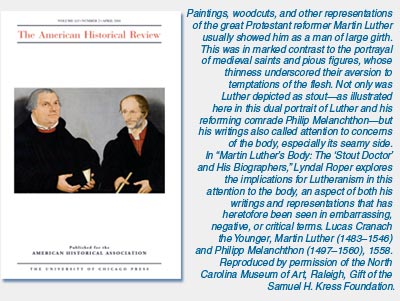 Members of the AHA should be receiving the April 2010 issue of the American Historical Review very soon. In it they will find articles on the physicality of Martin Luther and on suicide in colonial Africa, and an AHR Forum on aspects of political culture in South Asia. There are also five featured reviews, along with our normal extensive book review section. “In Back Issues,” a new section that we introduced last year, calls attention to articles and features in the AHR from 100, 75, and 50 years ago.
Members of the AHA should be receiving the April 2010 issue of the American Historical Review very soon. In it they will find articles on the physicality of Martin Luther and on suicide in colonial Africa, and an AHR Forum on aspects of political culture in South Asia. There are also five featured reviews, along with our normal extensive book review section. “In Back Issues,” a new section that we introduced last year, calls attention to articles and features in the AHR from 100, 75, and 50 years ago.
“Martin Luther’s Body: The ‘Stout Doctor’ and His Biographers,” by Lyndal Roper, takes a fresh look at the great reformer, focusing on the way depictions emphasizing his “monumentality” and his own relationship to his body informed the theology of Lutheranism. “This was a man whose body was fundamental to his personality,” she writes. In contrast to saints and other pious figures, whose thinness illustrated their aversion or indifference to the temptations of the flesh, Luther’s stoutness was an unmistakable feature of his iconographic representations. Roper focuses on more than Luther’s size; she also explores the way he constantly referred to the body—and specifically his body—in his writings and pronouncements, especially in the famous Table Talk.
In “Suicide in Late Colonial Africa: The Evidence of Inquests from Nyasaland,” Megan Vaughan acknowledges that the history of this phenomenon in Africa remains largely unwritten. Previous studies have argued that suicide rates on the continent were low, but the statistical basis for this assertion is narrow; and most studies of the subject seem to be based on the dubious assumption that African people rarely experienced guilt or depressive illness. Using the records of inquests into suicide cases in late colonial Nyasaland, Vaughan presents a study of the nature of suicide in that region and examines the role of the inquest in the history of suicide in Africa.
AHR Forum: The State in South Asian History
This Forum brings together three studies that provide different perspectives on politics—political processes, political identities, and political cultures—in India and Sri Lanka. In “Rule of Law, Rule of Life: Caste, Democracy, and the Courts in India,” David Gilmartin examines the history of electoral democracy in India in the years after 1947. Focusing on caste, which played a critical role in elections even as the law technically barred appeals to caste as a corrupt electoral practice, he argues that India’s jurisprudence relating to caste and elections was directed toward sustaining a paradoxical relationship between the universal and the particular as a foundation for India’s democratic order.
In “Ethnicity, Indigeneity, and Migration in the Advent of British Rule to Sri Lanka,” Sujit Sivasundaram examines the history of the divide between the Sinhalese and Tamils of Sri Lanka from a transnational perspective. With the flow of kings, traders, monks, and troops under colonialism, the British bound the island into a separate unit of governance. In the process, they exalted a sense of indigeneity which they applied to the Sinhalese, as opposed to those they termed “Malabar,” a term that later became “Tamil.” By noting the shifting placement of the island in the wider region, this article attempts to explain how ethnic differences were articulated out of the mutating connections of the local to the regional and global.
Mithi Mukherjee’s “Transcending Identity: Gandhi, Nonviolence, and the Pursuit of a ‘Different’ Freedom in Modern India” is a historical exploration into the Gandhian discourse of “renunciative freedom.” As opposed to Western understandings of political freedom, which are anchored in notions of national identity, the nation-state, individual rights, and private property, Gandhian freedom had its origins in Indic traditions. In contrast to most historians, who approach Gandhi as unique, Mukherjee shows that he was the culmination of a long line of important thinkers in modern India who sought to negotiate the competing claims of the two discourses of freedom, a project that had emerged as the central intellectual problem in colonial India.
In his comment, “‘History Is Past Politics’? Archives, ‘Tainted Evidence,’ and the Return of the State,” Todd Shepard, who has written about decolonialization in northern Africa, reads these three essays as moves back to politics and state-centered history among imperial and postcolonial historians. Shepard endorses this move, but he also calls attention to the snare of archives as constructed by national states and political institutions. We must, he concludes, ask ourselves “why sources are available and how their availability is organized.”
The June 2010 issue of the AHR will include two articles on the place of food in colonial Jamestown and Spanish America; one on the history of language in Meiji Japan; and one on the 13th Amendment to the U.S. Constitution. It will also include an AHR Exchange on William Novak’s June 2008 article, “The Myth of the ‘Weak’ American State.”
Robert Schneider (Indiana Univ.) is the editor of the American Historical Review. He can be reached at raschnei@indiana.edu.
Tags: AHA Activities Scholarly Communication
Comment
Please read our commenting and letters policy before submitting.






